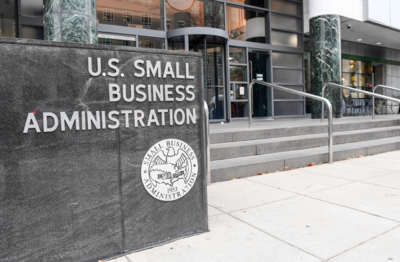
Senator Cardin on the SBA and other issues before Congress
Democratic Senators reintroduced a bill to create an office in the Small Business Administration to bolster underserved businesses.
Best listening experience is on Chrome, Firefox or Safari. Subscribe to Federal Drive’s daily audio interviews on Apple Podcasts or PodcastOne.
Several Democratic Senators have reintroduced a bill they tried in 2019. It would create a new office within the Small Business Administration called the Office of Emerging Markets. For what the new office would do and why, Federal Drive with Tom Temin turned to one of the principal sponsor, Senator Ben Cardin (D-Md.).
Interview transcript:
Tom Temin: Senator Cardin, good to have you on.
Ben Cardin: Always good to be with you, thank you
Tom Temin: Talk about the SBA bill that you have reintroduced, I guess it’s back from 2019. And specifically, it would create a new office, what would this office do and what problem do you think it would be solving?
Ben Cardin: The legislation I filed would create an office of emerging markets within the SBA, and it’s aimed at dealing with the reality that when you look at the use of the SBA tools, you see that minority small businesses are not getting the attention that they need. Only four and a half percent of the 7(a) loans went to black businesses, only 8.5% went to Hispanic businesses, only 18% went to women owned businesses. So we need to do a better job of helping underserved communities in the growth of small businesses, particularly in emerging markets. The numbers are even less we look at venture capital that’s available in minority communities. So this office would allow for a focus in SBA to help underserved communities in their entrepreneurship, the development of small businesses and the sustainability of small business.
Tom Temin: And the statistics that you cite, are those fairly new? I only ask because the studies cited in the introduction of the bill in the press release had some 10 or 11 year old figures showing some of the numbers of the low take up by minority owned businesses and so forth of these programs. Do you feel that’s still the case today?
Ben Cardin: Well, the numbers I cite are based upon fiscal year 2018 numbers. So they’re not the current but there as current as we have. And I think you would find that if anything, the numbers are probably even worse today than they were in fiscal year 18 because of the pandemic has a more direct impact on minority communities.
Tom Temin: Sure. And so do you see the problem as not so much that minorities don’t get the loans if they’re qualified when they apply is that they don’t seem to be as aware of the programs or have access to them in the first place?
Ben Cardin: Well, that’s correct. The 7(a) programs and some of the other loan programs, you need to have a relationship with a financial institution. And we know that’s more challenging in minority communities and underserved communities. Just not as many banking institutions that are interested in doing business there. They also find that they generally minority businesses get smaller loans, they get them more expensive, and with the interest rates, etc. So there has been an historic discrimination in minority communities that have not yet been rectified. So when we look at particularly in a pandemic, where you have a recession, it’s even more challenging. And that’s why we need to step up and provide that service within SBA to connect small businesses with programs that are available. Just one example, the micro-loan programs working much more effectively. So let’s take the lessons learned in the micro-loan program and apply that to more of the tools available under the SBA.
Tom Temin: And do you have a House counterpart at this point?
Ben Cardin: Yes, this bill is also being considered in the House. I work very closely with our House counterparts on the SBA programs. So we had Representative Finkenauer who was the cosponsor of the bill in the House, along with Congressman young.
Tom Temin: And do you have any feedback or ideas on this from SBA itself?
Ben Cardin: In my conversations with our nominee, Ms. Guzman, who’s going to be the administrator of the SBA, we talked about this specific program. I’ve also talked with Dr. Yellen, the Secretary of the Treasury, about this program, and there is clearly an interest. Some of this can be done administratively, it doesn’t need Congress. But we also want to make sure that there is permanent help to the underserved communities.
Tom Temin: We’re speaking with Maryland Senator Ben Cardin. A couple of other questions while we have you. We understand that you are planning to reintroduce another bill, the Green Buildings Job Act. Tell us about that and what your plans are.
Ben Cardin: Well, the General Services Administration is one of the largest purveyors of construction in the world, responsible for all the federal facilities, and we can make a major improvement in the footprint on our environment. So as President Biden has indicated in his priority to engage the international community and being a leader in the international community on environmental issues, we believe that we can be a very responsible party in the buildings that we construct and lease. So it’s a win-win situation. We find that this creates more jobs, the green energy fields are much more efficient on job creation. It also makes us more energy independent, and also helps our environment, so we think it’s a win-win-win situation. This bill would put a focus on the environmental footprint are the buildings that are under federal control.
Tom Temin: Yeah, so both the buildings that are owned by the federal government, but also where they might be the major tenant.
Ben Cardin: That’s correct. We have an inventory of government owned buildings, as well as government leased buildings.
Tom Temin: And I wonder if from that standpoint you’re thinking that given what’s been happening with telework that maybe the government coming back out of the pandemic doesn’t need so much space in the first place.
Ben Cardin: That’s a very important point. We know that the post COVID world is going to be different than the pre COVID world. We’ve all become a lot more efficient in the use of our time, as a result of COVID-19, doing so much more by the internet by video conferencing. And we know that we had telework prior to COVID-19, and we were trying to expand that for the convenience of our workforce and the efficiency of our workforce. We think that now it will be a much more significant part of federal work option. And that means, yes, our footprint on the need of spaces should be dramatically reduced. And I think going forward, we need to put that into the equation that will help the taxpayers of this country and will also make I think federal government services much more efficiently provided.
Tom Temin: And looking at one of the federal buildings, namely the Capitol, which is under the legislative branch. What’s your vision, just as one senator and one person who spends time in there, for what the security should look like in the future having been through the events of January 6? Should there be a permanent fence way around the outskirts of the whole property and that’s just the way it is for the American public now?
Ben Cardin: Well, obviously, January 6, was a frightening time for our country, an insurrection, an attack on our capital. And we should have been better prepared, there’s no question about that. So I think we have to take our cues from the security experts that we have that work for us and the intelligence information we receive about potential challenges to the Capitol itself. At this particular moment, we know that those levels are rather high and as you see the Capitol, it’s not the site that we would like to see. We’d like to capitol be open to the public, we want to make sure that our democracy is open to the public. And it’s not the visual image of American democracy. But we need to make sure that we keep people safe, we keep our Capitol safe, we keep the people who work in the Capitol safe. And our democracy depends upon the functioning of the US Capitol. So we have to follow the recommendations of our security experts, but we hope that we will be able, within a short period of time, to return to a more normal look at the US Capitol.
Tom Temin: Because I really love that shortcut walking across the back of it on the east side to be able to get from one side of town to the other walking from the ballpark. That’s my personal interest. And if you’ve got just another minute, I wanted to ask you about those Trump administration executive orders affecting federal employment and federal employees, those have all been undone by the Biden administration. Do you think now it’s up to Congress to take seriously the notion that some members have been talking about for a long time, and that is a comprehensive look at civil service reform?
Ben Cardin: Well, absolutely. We saw the vulnerability for civil service with hospital administration. What President Trump was able to do by executive orders, compromising the rights of federal workers to have a say in their employment, to have working conditions that are safe. So many different factors were compromised by executive action directed by President Trump. So it is important that President Biden reverse that and he’s doing that. But from a point of view of having predictability about the future and having permanency in regards to these protections, it’s important for Congress to act. So now it’s the time for Congress to act recognizing that we don’t want to go through another type of administration such as the Trump administration.
Tom Temin: And being a Baltimorean as well, you must be looking at Social Security Administration in particular where there’s really been some very tough labor relations over the past several years.
Ben Cardin: No question about it. We’re very proud in Maryland to have so many federal facilities that are located in our state, Social Security Administration of course, Baltimore is a major part of our community, and we’re very proud of the work that’s done there. And you’re right, the attack on the workers at Social Security was unprecedented by this administration, but it also affects workers in just about every one of our federal installations. We want to make sure that their voices are heard, that they have the right to collectively negotiate, that they have a right to expect that there’ll be safety in the workplace, that will implement fairly the telework procedures, that their benefits are going to be protected and they’re not going to be compromised in with the conditions of the work that they signed up for, and that they have the resources in order to carry out the mission. All of that’s important. And that’s why moving forward, we really need to have a focal point in Congress to make sure our federal workers recognize we not only appreciate their work by what we say but what we do.
Tom Temin: Maryland Senator Ben Cardin, thanks so much for joining me.
Ben Cardin: Well my pleasure. Good to be with you. Stay safe everybody. Thanks.
Copyright © 2025 Federal News Network. All rights reserved. This website is not intended for users located within the European Economic Area.
Tom Temin is host of the Federal Drive and has been providing insight on federal technology and management issues for more than 30 years.
Follow @tteminWFED





